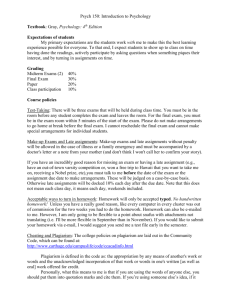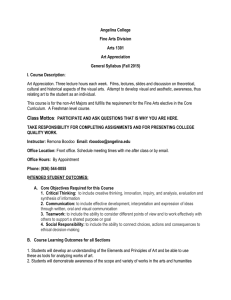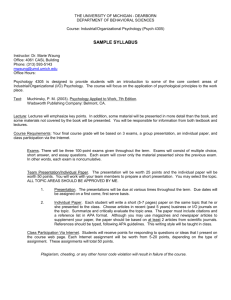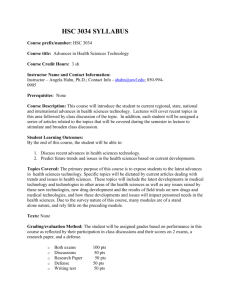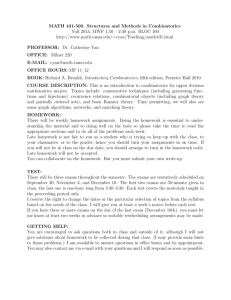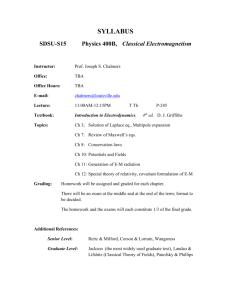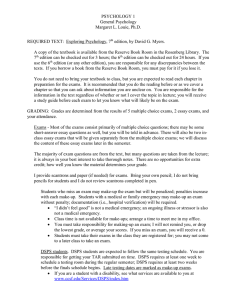Social Psychology - Shelley Dean Kilpatrick
advertisement
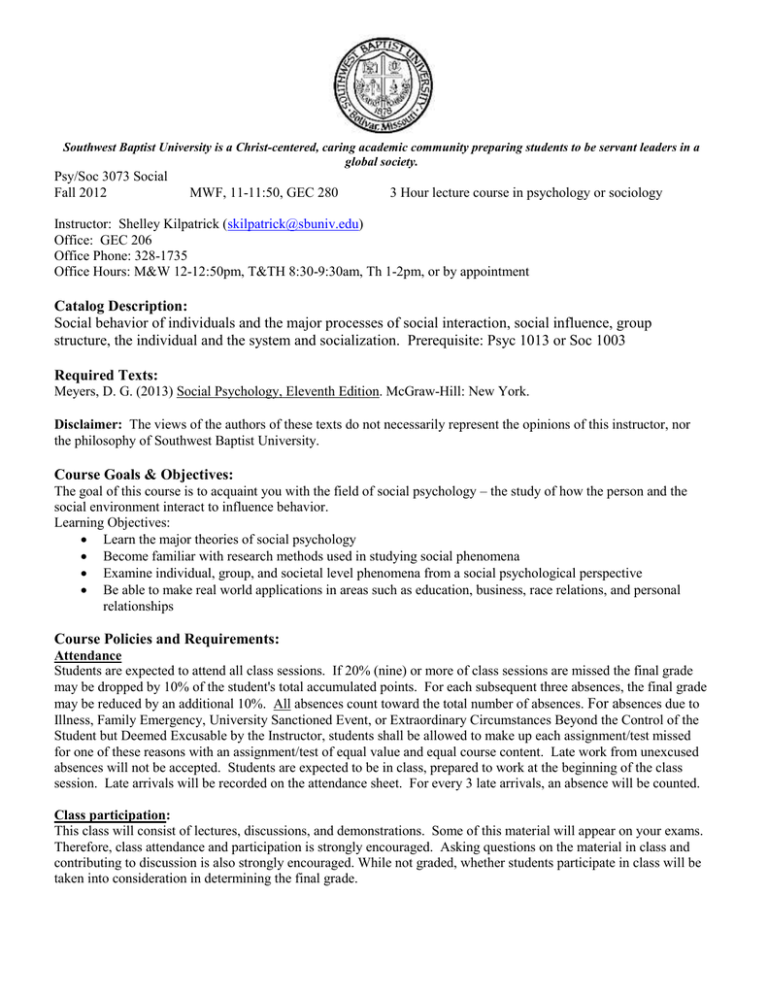
Southwest Baptist University is a Christ-centered, caring academic community preparing students to be servant leaders in a global society. Psy/Soc 3073 Social Fall 2012 MWF, 11-11:50, GEC 280 3 Hour lecture course in psychology or sociology Instructor: Shelley Kilpatrick (skilpatrick@sbuniv.edu) Office: GEC 206 Office Phone: 328-1735 Office Hours: M&W 12-12:50pm, T&TH 8:30-9:30am, Th 1-2pm, or by appointment Catalog Description: Social behavior of individuals and the major processes of social interaction, social influence, group structure, the individual and the system and socialization. Prerequisite: Psyc 1013 or Soc 1003 Required Texts: Meyers, D. G. (2013) Social Psychology, Eleventh Edition. McGraw-Hill: New York. Disclaimer: The views of the authors of these texts do not necessarily represent the opinions of this instructor, nor the philosophy of Southwest Baptist University. Course Goals & Objectives: The goal of this course is to acquaint you with the field of social psychology – the study of how the person and the social environment interact to influence behavior. Learning Objectives: Learn the major theories of social psychology Become familiar with research methods used in studying social phenomena Examine individual, group, and societal level phenomena from a social psychological perspective Be able to make real world applications in areas such as education, business, race relations, and personal relationships Course Policies and Requirements: Attendance Students are expected to attend all class sessions. If 20% (nine) or more of class sessions are missed the final grade may be dropped by 10% of the student's total accumulated points. For each subsequent three absences, the final grade may be reduced by an additional 10%. All absences count toward the total number of absences. For absences due to Illness, Family Emergency, University Sanctioned Event, or Extraordinary Circumstances Beyond the Control of the Student but Deemed Excusable by the Instructor, students shall be allowed to make up each assignment/test missed for one of these reasons with an assignment/test of equal value and equal course content. Late work from unexcused absences will not be accepted. Students are expected to be in class, prepared to work at the beginning of the class session. Late arrivals will be recorded on the attendance sheet. For every 3 late arrivals, an absence will be counted. Class participation: This class will consist of lectures, discussions, and demonstrations. Some of this material will appear on your exams. Therefore, class attendance and participation is strongly encouraged. Asking questions on the material in class and contributing to discussion is also strongly encouraged. While not graded, whether students participate in class will be taken into consideration in determining the final grade. Reading assignments: Reading assignments are listed on the syllabus below. Additional reading assignments may be provided throughout the semester. Students are responsible for reading each assignment before each class session. While not graded, whether students are prepared for class will be taken into consideration in determining the final grade. Assignments: Essays online: (20 points) Four online essays will be assigned and graded. Each will be worth 5 points. See the syllabus below for due dates. More details will come. Election Homework: (ungraded or extra credit) We’ll be applying social psychology to election coverage in the media to examine persuasion attempts, leadership, person perception and self-presentation of candidates, etc. There will be some assignments to do on your own time and we’ll discuss them in class – looking at web sites of candidates, watch one debate, evaluate commercials, etc. Some will be ungraded (but collected), others will be extra credit. Social Psych Proverb Critique Paper (50 pts): You will be required to write a summary and critique of a social proverb, like “Absence makes the heart grow fonder”, using research articles, 5-7 typed pages. A more detailed assignment sheet is posted on Angel. LATE PAPERS WILL BE PENALIZED!!!! Failure to complete this requirement will result in failure in the course. Any student concerned about the correct way to summarize or cite in papers should visit http://www.princeton.edu/pr/pub/integrity/08/intro/index.htm an excellent resource available from Princeton University. Creative Expression Project (50 points): Grade will be determined based upon the completion and submission of a course summary paper or synthesis project with explanatory paper. Failure to complete this requirement will result in failure in the course. 1. Creative Expression Project: Creative expressions such as original music lyrics, poetry, photography, and other arts can be submitted in lieu of some of the pages of text. A brief explanation (1-2 pages) of how the creative expression integrates or applies what you’ve learned in learned in class must still accompany the creative expression. The time and effort put into the project should be substantial and worthy of 50 points, not thrown together the night before. Exams (225 pts): Four exams will be given, including the final. The final exam will include the last unit and questions from the entire semester. Exams will contain multiple choice, fill-in-the-blank, matching questions, short answer, and short essay. Tentative dates for exams are listed on the course outline. Make-up exams will only be given for excused absences. Instructor must be notified prior to exam time if the student will need to make up an exam and all make-up exams must be taken within one week of the scheduled date. Grading: Possible Points: A = 90-100% B = 80-89% C = 70-79% D = 60-69% F = 59% or less Exams 1, 2, 3 Online Essays Social Proverbs Paper Creative Expression Final Total 150 pts 20 pts 50 pts 50 pts 75 pts 345 pts Extra Credit Options You may only earn up to 20 extra credit points this semester. 1. Book Report: (20 points). Read Blink: The Power of Thinking Without Thinking by Malcolm Gladwell. OR Gladwell, M. (2002). The Tipping Point: How Little Things Can Make a Big Difference. Back Bay Books: New York. The book review should be typed, about 3 pages long. Please include: a. Summary of the key points of the book. Prove to me you read the book. b. How what you have learned in class or from your textbook relates to the book. Show me that you can apply what you read to something you have learned in class. c. You opinions about the book – did you like it or not, would you suggest someone else read it, etc. 2. New Cultural Experience: (10 points each). You may participate in any of the following and write a 1-2 page description of the event/experience. A well-done paper will be worth up to 10 points. A) Attend a religious service of a different religion (If you are evangelical and/or protestant, you may attend Catholic or Eastern Orthodox services. You may also attend services of an entirely different religion.) B) Eat at a restaurant serving an ethnic cuisine that you’ve never tried. C) Attend a cultural event (parade, festival, celebration, performance) in which you can experience a different culture. All Extra Credit papers should contain the following elements: a. Name, time, and place of the field experience b. Summary of the event or experience – Include who, what, when, where, why, and how. c. How what you have learned in class, from your textbook, or from the discussion board relates to the event or experience. d. Personal critique (good and bad) of the event or experience and explanation of why you liked the things you liked and didn’t like the things you didn’t like. Would you do this or something similar again? Electronic devices Cell phone use, of any kind (including texting), during class is strictly prohibited except in cases of emergency. Then, when possible, the professor should be notified. The ring mode should be switched to one that will not disturb the class. Anyone using a cell phone in class, for any other purpose, including instant messaging, taking photographs, surfing the web, or playing games, will have the phone confiscated until the end of the class. Some electronic devices can be beneficial to the learning process. The use of laptop computers and PDAs is permissible for course related purposes. Any other use will subject the electronic device to confiscation by the instructor. Weather: Students should never endanger themselves in order to attend class in severe weather. Students should check the university website/phone line or local TV/radio stations for notice of university closing. If the university is open, assume class will be held. In the event that the instructor cannot make it to class, an attempt will be made to inform students via Angel and by checking in with the behavioral sciences department. Disability Statement: Southwest Baptist University desires to provide all students with optimum learning experiences. If you have a disability that impacts learning in this course, you must inform your instructor in order to receive special assistance. Academic Integrity Policy: Class C violations consist of unacceptable moral or ethical behavior; serious law violation(s); serious damage to property; or behavior that is harmful (or potentially harmful) to self, others, or the university. Therefore, the following class C violations are considered potentially dismissible offenses, depending on the severity of the incident. 1. Violation of federal, state, or local laws. 2. All forms of academic dishonesty such as plagiarism, cheating, and violation of the computing resources policy. The computing resources policy appears in the Student Handbook under “Services for Students.” a. Plagiarism: (1) Using the ideas or writings of another as one’s own; (2) Appropriating passages or ideas from another and using them as one’s own, as defined in the American Heritage Dictionary of the English Language, New College Edition published by Houghton-Mifflin, 1980. i. Examples of plagiarism include, but are not limited to: (1) Using ideas, words or phrases, and/or wholesale scripts from another’s work without proper acknowledgment. (2) Submitting the same work in two courses without the written permission of each instructor. ii. Additional examples of plagiarism may be found in the textbooks for English Composition I and II. b. Cheating: (1) To deceive by trickery; (2) To mislead; (3) To practice fraud; and/or (4) To act dishonestly, as defined in the American Heritage Dictionary of the English Language, New College Edition published by Houghton-Mifflin, 1980. Examples of cheating include, but are not limited to: i. Collaborating without authorization ii. Presenting work done by another as one’s own, either in part or in whole. iii. Altering a paper or other evaluation instrument after the grade has been assigned for the purpose of misrepresenting the student’s performance. iv. Enlisting another person to take one’s evaluation procedure. v. Using prohibited sources of information for examinations or other testing procedures. vi. Knowingly providing any unauthorized assistance to other students. vii. Falsifying or changing information concerning academic achievement. viii. Facilitating any act that promotes academic dishonesty including the withholding of information concerning the academically dishonest conduct of another. Department of Behavioral Sciences Mission Statement: The mission of the Department of Behavioral Sciences is to prepare students to investigate and evaluate the human experience and to develop skills of intervention, prevention, and protection accompanied by the integration of faith and discipline. Department of Behavioral Sciences Vision Statement: The Vision of the DBS is to develop within students an understanding of the human being as a thinking and behaving person with a knowledge of the methodology that permits such a scientific inquiry by: providing academic and practical experiences in the areas of psychology, sociology, human services and criminal justice challenging students to seek academic and scholarly excellence encouraging students to increase self-awareness and individual development, while integrating Christian faith within their chosen field increasing the students’ sensitivity to gender, racial and cultural diversity issues, and ethical and professional concerns Further, the department has the unique vision of helping the academic community in their own personal lives as situations merit special attention in counseling and assessment. TENTATIVE COURSE SECHEDULE Date 8/20 8/22 8/24 8/27 8/29 8/31 9/3 9/5 9/7 9/10 Unit/Topic First day of class – Introduction to Social Psychology Thinking about Social Psychology Methods of Social Psychology Methods: Ethics and Data Issues Wrapping up Methods The Self No Class – Labor Day The Self The Self The Self 9/12 Social Perception 9/14 Causal Attributions 9/17 Causal Attributions 9/19 9/21 Exam 1 (Chapters 1-3) Social Expectations 9/24 Social Judgment 9/26 Social Judgment 9/28 10/1 10/3 10/5 10/8 10/10 Attitudes: Measurement and Behavior Attitudes: Behavior Affects Attitudes Behavior Affects Attitudes Persuasion – Two Routes Elements of Persuasion More Persuasion 10/1110/14 Fall Break- No Classes 10/15 10/16 10/17 Resisting Persuasion Mid-term grades due at noon Exam 2 (Chapters 3, 4, 7) Readings and Assignments Read Syllabus Chapter 1 Chapter 1 Chapter 1 Chapter 1 Chapter 2 Chapter 2 Chapter 2 Chapter 2 Online Self Essay Due Chapter 3, p. 75-83 Chapter 3 p. 99-117 Chapter 3 p. 99-117 Study Hard Chapter 3 p. 99-117 Chapter 3, p. 84-98 Social Proverbs Paper Due Chapter 3, p. 84-98 Chapter 4 Chapter 4 Chapter 4 Chapter 7 Chapter 7 Chapter 7 Online Attitudes Essay Due Chapter 7 Study Hard Date Unit/Topic 10/19 Leadership 10/22 10/24 10/26 10/29 10/31 11/2 11/5 11/7 11/9 11/12 11/14 11/16 11/1711/25 11/26 Groups - Social Facilitation and Social Loafing Group Polarization and Groupthink Deindividuation and the Mob Conformity Conformity and Uniqueness Obedience – Milgram Film Obedience Movie Day – Stanford Prison Study Prejudice and Discrimination Prejudice and Discrimination Groups and Discrimination wrap up Exam 3 (Chapters 6, 8, 9) Thanksgiving Break, No Classes 11/28 11/30 12/3 12/5 12/7 12/10 Friendship Romantic Relationships Romantic Relationships Romantic Relationships Altruism and Helping Altruism and Helping Wed, Dec 12 FINAL EXAM – 8-10am Chapters 10-12 and comprehensive Friendship Readings and Assignments Chapter 8, p. 294-297 Chapter 8 Chapter 8 Chapter 8 Chapter 6 Chapter 6 Chapter 6 Chapter 6 Chapter 9 Chapter 9 Chapter 11 Online Prejudice Essay Due Chapter 11 Chapter 11 Chapter 11 Chapter 11 Chapter 12 Chapter 12 Online Altruism Essay Due Final Exams: Teachers are expected to administer final examinations at times scheduled and are not permitted to excuse students for any reason. Students are expected to be present for examinations at designated times. Plan your holiday travel, elective surgeries and doctors apointments, wedding attendance, etc. accordingly. A student who has three or more final examinations on the same day can change a final exam without cost. It is recommended that the middle final exam be changed. This is handled through the office of the Dean of Education and Social Sciences for this course. College Scripture: "For this very reason, make every effort to add to your FAITH, GOODNESS; and to GOODNESS, KNOWLEDGE; and to KNOWLEDGE, SELF-CONTROL; and to SELFCONTROL, PERSEVERANCE; and to PERSEVERANCE, GODLINESS; and to GODLINESS, BROTHERLY KINDNESS; and to BROTHERLY KINDNESS, LOVE." 2 Peter 1:5-7
